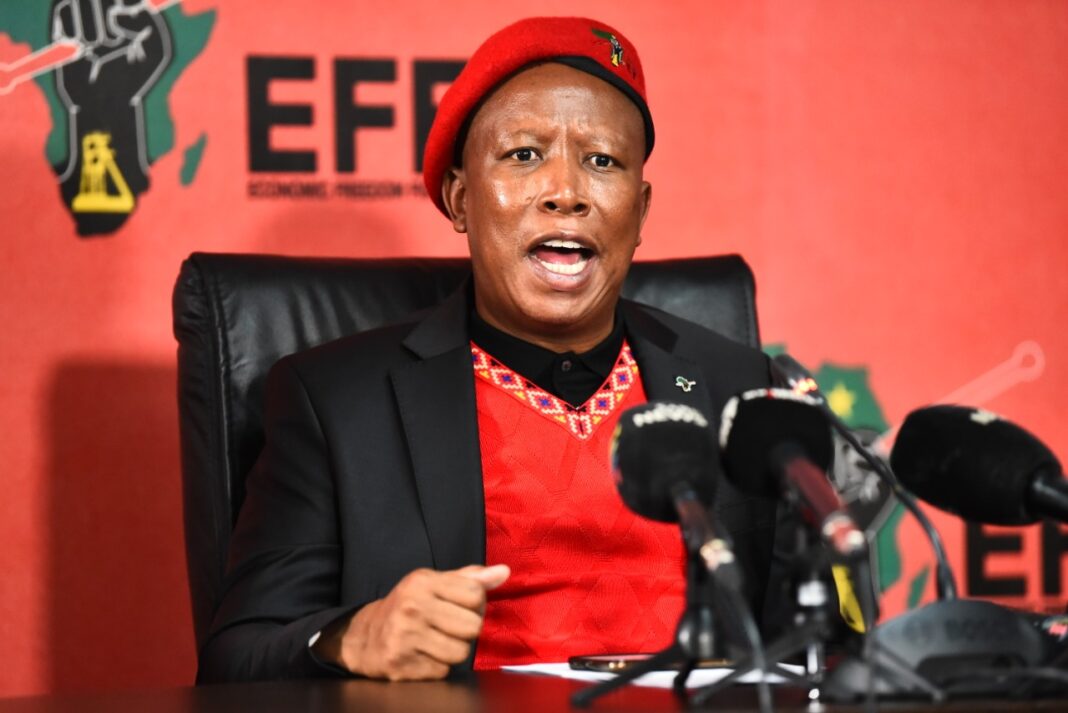EFF leader Julius Malema said on Thursday that attempts by Council for Advancement of the SA Constitution (CASAC) to remove him from the Judicial Service Commission (JSC) were motivated by racism orchestrated by a powerful ‘Indian cabal’.
On Thursday, the council launched an application in the High Court in Johannesburg to challenge the constitutionality of the Judicial Services Commission (JSC)’s recent interview process for the country’s top judges
The council is unhappy with the recent interview process to shortlist five candidates for the Constitutional Court bench.
The council said the “personal attacks” by JSC commissioner, Julius Malema, on Judge Dhaya Pillay, for her friendship with Public Enterprise minister Pravin Gordhan, showed that party political considerations and political agendas are at play.
Briefing the media on Thursday, Malema said the EFF has briefed its own lawyers to join in the Constitutional Court case initiated by CASAC.
“We view the campaign by CASAC to remove CIC Julius Malema from the Judicial Service Commission as a racist attempt to continue the influence of the Indian cabal on the judiciary,” said Malema.
Malema said in essence, CASAC is fighting for Gordhan’s friend who was rejected by an open and transparent process of the JSC to be re-imposed on the judiciary.
“There is an Indian agenda in South Africa that’s led by Pravin Gordhan, that’s why CASAC is going to court, they wanted me to be removed from JSC interviews yet I have been asking the same questions; there was no problem, now we touch an Indian woman, they jump,” Malema.
“The Indian cabal led by Pravin Gordhan has been working since the 1980s as a perfect masquerade of the White Monopoly establishment to exercise influence on the congress movement, and now the institutions of the post-1994 democratic state. This cabal has had unrestricted ability to manipulate its way into influential judiciary positions over the years, until the presence of the EFF on the JSC.”
In its affidavit, the council’s head Lawson Naidoo said the manner of questioning of some of the candidates went beyond the bounds of what is permissible.
“Commissioners did not approach their task with an open mind. A coordinated attack was levelled against candidates based on spurious grounds, like their distant friendship with Ministers, their brief membership of civil society organisations like the Jewish Board of Deputies, and their ‘temperament’ (a line of questioning, I note, that male candidates seem to have been spared),” said Naidoo.
“Some commissioners were even candid about their intention to ‘argue’ against the nomination of particular candidates in deliberations. Alone, that gives the game away.”
He added: “The JSC’s process should not be adversarial; the JSC should not be ‘arguing’ for or against a candidate. Regrettably, it appears that some commissioners approached the interviews with a closed mind about particular candidates.”
Naidoo says political parties should not sit on the commission.
“The interviews are not a platform for party politics; they are not there for the JSC to investigate and evaluate complaints against judges; and they are not there to give commissioners a chance to quibble with judgments they lost as litigants,” he said.
“Nor do they exist to enable individual commissioners to ventilate grudges against judges. Party political considerations and political agendas should play no role in the JSC’s decisions and processes.”
“The JSC’s obligation to guard its independence — and, through it, the judiciary’s independence — rests on each individual commissioner as well as the JSC’s chairperson who has ultimate responsibility to control the conduct of meetings, interviews, and deliberations.”
The council wants the high court to declare the JSC’s recent interviews unlawful and to set aside its recommended list to President Cyril Ramaphosa for appointment to the country’s apex court.
- Inside Politics



